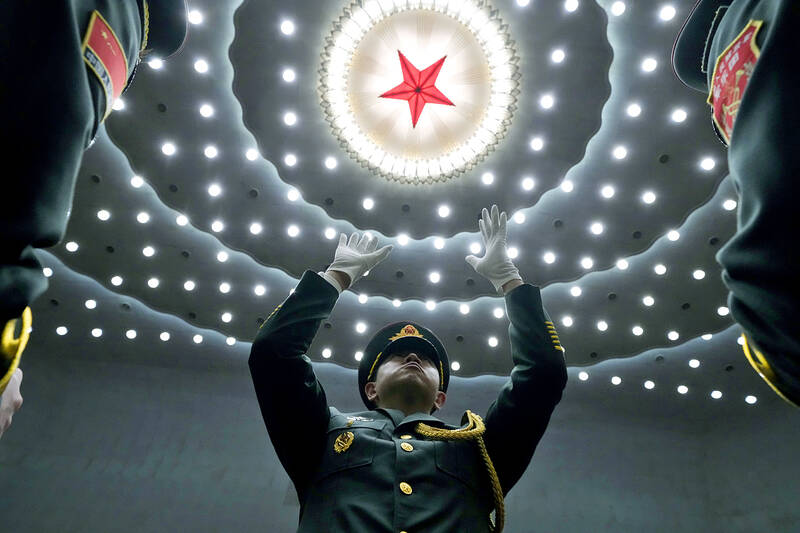Chinese President Xi Jinping (習近平) appears to be planning a fourth term in 2027, as he did not indicate a successor at the Chinese Communist Party’s (CCP) 20th National Congress, Academia Sinica researcher Wu Yu-shan (吳玉山) said yesterday.
Xi yesterday secured an unprecedented third term as CCP general secretary and chairman of the CCP’s Central Military Commission, as the party unveiled its new leadership for the next five years.
The CCP traditionally grooms successors by promoting young leaders to permanent positions, and then assigning them suitable responsibilities, Wu told a news conference held by the Fair Winds Foundation in Taipei.

Photo: AP
NO BACKUP
“That we did not see any young appointees this time implies that Xi has no intention of designating a successor,” he said. “Also, the youngest member of the Politburo Standing Committee is Ding Xuexiang (丁薛祥), and he is already 60. So, at most he would only serve for one term if he took over from Xi.”
Since Xi became CCP general secretary, there has been a high concentration of power, and a decreased focus on institutionalization in China, Wu said, adding that the situation was reminiscent of China under Mao Zedong (毛澤東).
“The trends we are seeing with regard to Xi are the centralization and expansion of power, and the breaking of patterns,” he said.
Wu said that a conflict in the Taiwan Strait would depend on Xi’s hold of power in China, Taiwanese politics and the US’ commitment to Taiwan’s defense.
Xi’s reinstatement increases the risk of war, but Taiwanese are highly resistant to Chinese aggression, which would be to the country’s benefit, he said.
The US’ apparent increase in strategic clarity toward Taiwan would serve as a deterrent to Chinese aggression, he added.
TOUGH TO PREDICT
Tamkang University researcher Chen Chien-fu (陳建甫) said that Xi’s policies on Taiwan would be more difficult to predict than in the past.
Although the CCP said it would not rule out the use of military force to unify Taiwan, wars are costly and China’s economy is struggling, he said.
“It’s most likely that China will attempt to force Taiwan to the negotiating table through a blockade in the Taiwan Strait,” he said.
The CCP National Congress ended on Saturday after endorsing amendments to the party’s constitution, including vows to build a state-of-the-art military to enforce its “one country, two systems” framework in Hong Kong and to “strongly and firmly oppose and contain Taiwan independence.”
It remains unclear how long Xi plans to rule, but he is certainly aiming to “accomplish some achievements” on the Taiwan issue for his legacy, China expert Chao Chun-shan (趙春山) said on Saturday.
Xi considers Taiwan unification an integral part of his “Chinese dream” of “great rejuvenation of the Chinese nation,” and he would seek a fourth term to give him more time to achieve that goal if necessary, said Chao, a professor emeritus at Tamkang University’s Graduate Institute of China Studies.
Taiwan must prepare to resist coercion from China, as maintaining the “status quo,” favored by most Taiwanese, is not one of Beijing’s options, he said.
Additional reporting by Chung Li-hua and CNA

CHAOS: Iranians took to the streets playing celebratory music after reports of Khamenei’s death on Saturday, while mourners also gathered in Tehran yesterday Iranian Supreme Leader Ayatollah Ali Khamenei was killed in a major attack on Iran launched by Israel and the US, throwing the future of the Islamic republic into doubt and raising the risk of regional instability. Iranian state television and the state-run IRNA news agency announced the 86-year-old’s death early yesterday. US President Donald Trump said it gave Iranians their “greatest chance” to “take back” their country. The announcements came after a joint US and Israeli aerial bombardment that targeted Iranian military and governmental sites. Trump said the “heavy and pinpoint bombing” would continue through the week or as long

TRUST: The KMT said it respected the US’ timing and considerations, and hoped it would continue to honor its commitments to helping Taiwan bolster its defenses and deterrence US President Donald Trump is delaying a multibillion-dollar arms sale to Taiwan to ensure his visit to Beijing is successful, a New York Times report said. The weapons sales package has stalled in the US Department of State, the report said, citing US officials it did not identify. The White House has told agencies not to push forward ahead of Trump’s meeting with Chinese President Xi Jinping (習近平), it said. The two last month held a phone call to discuss trade and geopolitical flashpoints ahead of the summit. Xi raised the Taiwan issue and urged the US to handle arms sales to

State-run CPC Corp, Taiwan (CPC, 台灣中油) yesterday said that it had confirmed on Saturday night with its liquefied natural gas (LNG) and crude oil suppliers that shipments are proceeding as scheduled and that domestic supplies remain unaffected. The CPC yesterday announced the gasoline and diesel prices will rise by NT$0.2 and NT$0.4 per liter, respectively, starting Monday, citing Middle East tensions and blizzards in the eastern United States. CPC also iterated it has been reducing the proportion of crude oil imports from the Middle East and diversifying its supply sources in the past few years in response to geopolitical risks, expanding

Pro-democracy media tycoon Jimmy Lai’s (黎智英) fraud conviction and prison sentence were yesterday overturned by a Hong Kong court, in a surprise legal decision that comes soon after Lai was jailed for 20 years on a separate national security charge. Judges Jeremy Poon (潘兆初), Anthea Pang (彭寶琴) and Derek Pang (彭偉昌) said in the judgement that they allowed the appeal from Lai, and another defendant in the case, to proceed, as a lower court judge had “erred.” “The Court of Appeal gave them leave to appeal against their conviction, allowed their appeals, quashed the convictions and set aside the sentences,” the judges